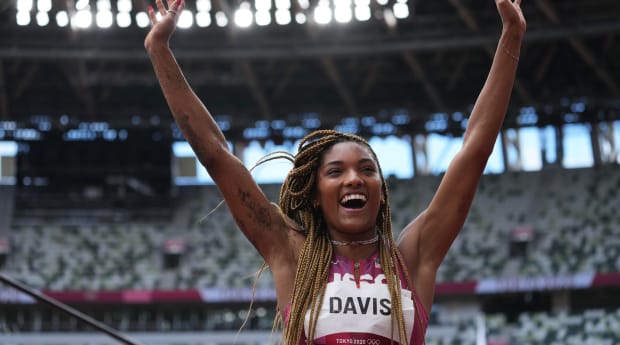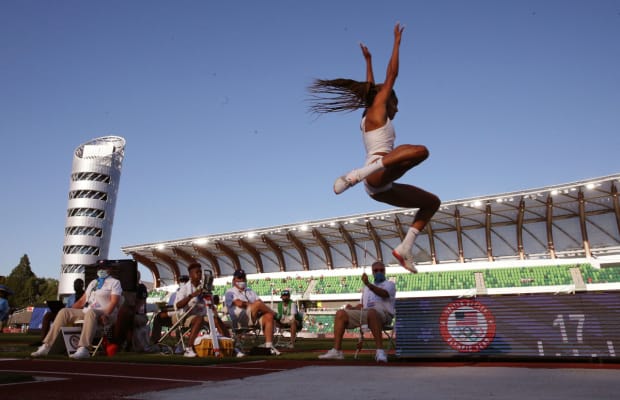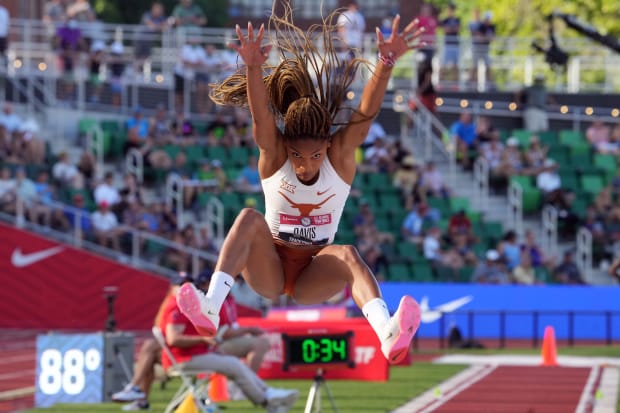At her first Olympics in Tokyo, long jumper Tara Davis competed alongside the Black women she idolized as a young girl. Now, the 22-year-old is paving her own path and using her platform to popularize track and field and address racism in sports.

Kirby Lee/USA TODAY Sports
In honor of Black History Month, Sports Illustrated is passing the pen to prominent Black voices across sports to reflect, reexamine legacies and share their stories and viewpoints on what lies ahead for the next generation of trailblazers.
Long jump is not a sexy event. It’s not like the 100 meters or the 200 meters—we don’t get the same amount of attention. No one really wants to watch it. But I’m trying to change that.
Social media has played a huge role in my career as a track and field athlete. I get to share my sport through my YouTube channel and show the world who I am and what I do. I bring a lot of eyes to the track and field world, but the attention isn’t always positive, and it doesn’t always have to do with my sport.
I got engaged to Paralympic track star Hunter Woodhall in September, and having him by my side has changed so much. Being with someone who competes in the same sport, they get you. They get the days when you’re not feeling good. They get the 24-hour need for massages. It’s easier to relate and easier to cheer each other on and be each other’s No. 1 supporter.
But not everyone feels that way about our relationship.

Chris Pietsch/The Register-Guard/Imagn Content Services, LLC
Just a few days ago, someone wrote to me and said, “Women like you are disgusting. I hope his grandfather owned your great-grandfather.” How are we even saying these things? I know they’re behind the keyboard, but they’re still thinking like that. It disgusts me. When I was younger, I let it affect me. But then I had the realization that they’re wasting their time.
I had great role models growing up who fought these battles for me on the track. My dad was one of the biggest. He was my coach when I was 4 up until 18. He was able to guide me through all of the new challenges that came in my life. I also had track and field icons like Allyson Felix and Brittney Reese, who dominated the sport ever since I could remember.
To see Black women excelling in my sport showed me that there’s no limit, and I could do whatever I wanted. These women were paving the way for me to do that. I couldn’t be more grateful to women like Allyson, Brittney and Jackie Joyner-Kersee for setting such a high standard to compete. After seeing their success, I wanted to be like them.
In my first Olympics this past summer in Tokyo, I competed with Brittney. It was a really cool moment for me. To know that I’m right up there next to the person I looked up to for all these years, it’s insane. What’s crazier is knowing that I’m that person for other young girls now.

Kirby Lee/USA TODAY Sports
When I go to track meets where there are younger kids, it humbles me. It shows me where I came from. When I was those kids meeting Brittney and Allyson, I was so starstruck and amazed. For me to be that person now, it inspires me and reminds me that I'm doing something right.
Since I am in the spotlight, I do have a responsibility. I know people are looking at me and there’s a lot of pressure behind that. Unlike a lot of other Olympic sports, track and field is pretty diverse. But across sports, there’s much more to be done, and I think my generation can spark that change.
Race is an uncomfortable topic to talk about. But being open-minded and able to express yourself, instead of just sweeping it under the rug, I think that’s amazing. That’s where the last generation may have failed. You weren’t supposed to talk about your feelings. I feel like our generation is going to change that. Social media is changing it, and we will help mend the world.
Having visuals is the difference-maker—broadcasting all these sports and being able to access these sports live. There are so many sports that no one knows about, and it’s sad. The Winter Olympics literally just showed that. There needs to be a better outlet or avenue for people to see these sports on a daily basis.
For me, I’m just going to continue what I’m doing—posting, showing people what goes on throughout my day, showing them what track and field is and educating them on what types of sports there are. We deserve as much watch time as any other sport. I'm trying to bring eyes to long jump and show what we can do. We're jumping 23 feet. That's insane! Men are jumping 28 feet. We’re literally throwing our bodies into a pit of sand.
While I continue to fight for publicity for my sport, I want to remind young girls of one thing: No matter what other people have to say, be yourself and never lose sight of who you are.